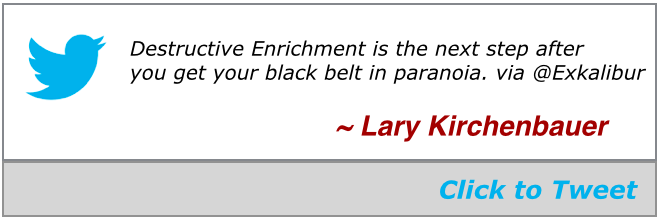Concepts about paranoia abound. Ask Andy Grove, Jim Collins, Muhtar Kent and me. B y any name, change is healthy, but it means you’ll have to dropkick some of the things you’re already doing … even if you’re in love with them.
A rose is a rose is a tulip? No, that’s not right. A rose is a rose is … well, by any other name, I think it’s still a rose. Right?
We’re pretty famous in this country for euphemisms, aren’t we, particularly for unwelcome issues.
Eternal rest.
Cement shoes.
Adult entertainment … I think you catch my drift.
How would you describe the Entrepreneurial Mentality?
There are also a lot of ways that the entrepreneurial mentality has been described.
We first read about “constructive paranoia,” a phrase popularized by Andy Grove, the former CEO of Intel in his book, Only the Paranoid Survive.
It’s hard to argue with his mantra:
“Success breeds complacency.
Complacency breeds failure.
Only the paranoid survive.”
He expanded upon this theorem in an Esquire interview in 2000 saying,
“A corporation is a living organism; it has to continue to shed its skin.
Methods have to change. Focus has to change. Values have to change.
The sum total of those changes is transformation.”
You don’t want your competitors up in your grille
In short, nothing stays the same.
The only thing that changes is change itself and as your competitors start to get up in your grille, you need to be hyper-alert so your organization doesn’t become yesterday’s news.
Grove was a man of action, and driven by his “constructive paranoia”, believed
“You have to pretend you’re 100 percent sure. You have to take action; you can’t hesitate or hedge your bets.
Anything less will condemn your efforts to failure.”
Next comes “Productive Paranoia”
Then there’s Jim Collins with the concept of “Productive Paranoia”, outlined in his latest book, Great by Choice.
Like Andy Grove, Collins believes things are always changing. The leaders of the 10x companies he describes are always asking, “what if”?
He, too, believes that successful executives must be hypersensitive to changing conditions:
“The 10x winners in our research always assumed that conditions can — and often do — unexpectedly change, violently and fast.”
We’re working hard to provide practical strategies, tools and tips to help you become a More Effective Leader. Check out the Featured Articles in our Leadership Library.
There’s no substitute for preparation
Persistently successful companies don’t wait for the storm to strike, they prepare.
They manage conservative balance sheets, hoarding cash in ways that most of wish we had done prior the onset of the unexpectedly harsh Great Recession appearing from the nether mist in late 2008.
Mr. Collins challenges us in his book to adopt a culture of productive paranoia:
“Regarding the biggest threats and dangers facing your enterprise, how much time before the risk profile changes?”
Are you “Constructively Discontent”?
Now comes along Muhtar Kent, the intense CEO of Coca-Cola.
He was recently interviewed in a Fortune article, and described his entrepreneurial passion as being “constructively discontent.” When asked what he meant by that, he said,
“Not fast enough, not innovative enough, not entrepreneurial enough.
It’s all about an entrepreneurial mentality.”
You’ll note that these concepts are rooted in “paranoia” and amplified by more positive terms like “constructive” and “productive,” to reflect that it’s all for the good … but these phrases aren’t really actionable.
They identify an enduring state of mind required to be a successful entrepreneur, with paranoia at its root, but what about after that?
[pullquote]”If you don’t like change, you’re going to like irrelevance even less.” ~ General Eric Shinseki, retired Chief of Staff, U. S. Army[/pullquote]
If you’ve got as far as paranoid, it’s time to act!
So, I’m going to take it up a notch with my own concept: Destructive Enrichment, which is the next step after you get your black belt in paranoia.
It’s meant to signify that it’s time for action, the most difficult aspect of change underlying the entrepreneurial struggle.
You see, I believe resistance to change is one of the most powerful forces in the universe. Steven Pressfield even wrote an entire manifesto, Do The Work, a vernacular attenuation of his book, War of Art, where he first introduced the Resistance.
What are you going to do with your “paranoia”?
It’s not enough to just be paranoid or discontented so that you’re eternally vigilant.
You also need to surmount the monumental forces of the Resistance.
You need the Destructive ingredient, an action verb not an emotional one, to empower you to actually tear down what’s not working, be bold enough to embrace your conviction and then, power through the Resistance.
Only then, can you move on to Enrichment, the beneficent result of your willingness to destroy what isn’t working and install something that will enrich your organization.
Call it what it is. Don’t pull any punches.
Sure, we could soften all of this … using words like “push aside” or “recreate” or “modify” old ideas … but I side with Andy Grove who didn’t believe you could hedge your bets.
If you’re unwilling to destroy the old and turn it into rubble, you will remain stuck in the past, distracted by the conventional frameworks that you’re holding too dearly.
Revision and modification of the status quo will become your goal instead creating a new and vibrant future.
Time to up your game. Tear it down. Build what you want.
So, if you’re already a master of paranoia, grab your second-degree black belt by applying Destructive Enrichment to overcome the constant strength of the Resistance.
It’s an actionable way to move forward and an opportunity to create productive solutions to overcome the Resistance.
Don’t forget the line from Nirvana’s late Kurt Cobain:
“Just because you’re not paranoid doesn’t mean they aren’t after you.”
Question: What are you going to do next? What is at least one thing you need to change up to get where you’re going? Be sure to visit our Facebook Page or @Exkalibur on Twitter to share your thoughts and comments.




